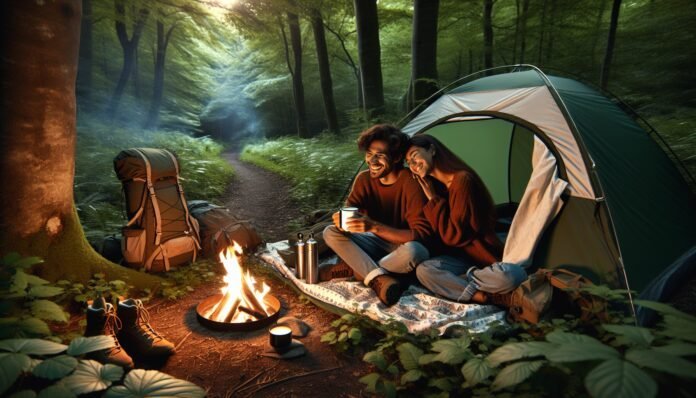Backcountry camping couples tips can transform an outdoor adventure into a truly unforgettable experience. Sharing the solitude of nature with your partner offers a unique opportunity to bond, but it also requires preparation to avoid common pitfalls. From packing efficiently to managing challenges like weather and navigation, planning ahead ensures a smooth trip. This guide will explore essential strategies to maximize comfort, safety, and enjoyment, helping you create lasting memories on the trail. Whether you’re seasoned campers or new to the wilderness, these practical insights will inspire your next adventure together.
Essential Pre-Trip Planning for Backcountry Camping as a Couple
Stepping into the backcountry with your partner is an adventure like no other. Proper planning can make or break this experience. From selecting the perfect destination to meal preparations, starting on the right foot is crucial. This section covers vital pre-trip planning tips that cater specifically to couples.
Researching the Best Backcountry Destinations for Couples
Choosing the right destination is key to a successful camping trip. For couples, this means finding areas that match both your interests and skill levels. Consider destinations known for serene landscapes, romantic sunsets, or thrilling hiking trails.
Factors to Consider:
- Accessibility: Check how easy it is to reach the location. Some places might require a long hike in.
- Privacy: Seek out sites with fewer crowds for a more intimate experience.
- Activities: Look for areas offering activities you both enjoy, like fishing, hiking, or star-gazing.
Research is your best friend here. Use online forums, social media, and travel blogs to gather insights. Local guidebooks can also provide valuable information. Don’t forget to verify all details with official park or forest websites to ensure accuracy.
Crafting a Practical Packing List for Two
Packing for two can be tricky, especially for backcountry camping. It requires a balance between carrying essentials and maintaining a manageable load. Focus on sharing items wherever possible to lighten the load.
Essential Items to Include:
- Shelter: A two-person tent or hammock setup. Ensure it’s lightweight and easy to assemble.
- Sleeping Gear: Double sleeping bag or two single bags that can zip together. Consider sleeping pads for comfort.
- Cooking Supplies: Portable stove, utensils, and a lightweight cookware set.
- Clothing: Layered clothing for varying temperatures, rain gear, and sturdy boots.
- First Aid Kit: Include any personal medications and general supplies like bandages and antiseptic.
Remember to check weather forecasts and adjust your list accordingly. Sharing responsibilities in packing can also prevent redundancy and reduce weight.
Planning Meals and Sharing Cooking Responsibilities
Food is a major part of your camping experience. It fuels your adventures and adds a touch of home comfort. Meal planning involves selecting easy-to-cook meals that both enjoy.
Tips for Meal Planning:
- Plan Simple Meals: Opt for meals with few ingredients that require minimal cooking. Think pasta, oatmeal, and trail mix.
- Share Cooking Duties: Divide tasks so one prepares breakfast while the other handles dinner.
- Pack Non-perishables: Prioritize foods that won’t spoil and offer high energy, like dried fruits and nuts.
- Consider Dietary Restrictions: Ensure meals cater to any dietary needs either of you might have.
Organize meals by day and pack them in labeled bags for easy access. Cooking together can also enhance teamwork, making the experience more enjoyable.
Building a Comfortable and Safe Backcountry Camping Experience
Creating a comfortable and secure environment is vital when camping as a couple. This ensures both partners feel relaxed and at ease in the wilderness. From gear selection to mastering navigation, a few key strategies can enhance your camping experience.
Selecting the Right Gear for Comfort and Compatibility
Investing in the right gear ensures comfort and compatibility during your trip. Sharing gear not only reduces weight but also brings you closer together.
Must-Have Gear:
- Tent: Choose a lightweight two-person tent for comfort and space. Ensure it has weatherproof features.
- Sleeping System: A double sleeping bag can add warmth and intimacy. Look for options with customizable temperature settings.
- Cooking Equipment: Opt for compact and efficient gear. Sharing a portable stove and utensils reduces load.
Prioritize quality over quantity. Renting gear can also be an option if you’re testing new equipment. Always test gear before departing to ensure familiarity and ease of use.
Mastering Navigation Skills and Staying Oriented Together
Navigation is a critical skill in backcountry camping. Both partners should know how to read maps and use a compass or GPS device.
Navigation Tips:
- Map Reading: Study the map together before heading out. Understand key landmarks and trail changes.
- Compass Use: Practice using a compass in a familiar area. It’s essential in case GPS fails.
- Technology: A GPS device can be a lifesaver. Ensure it’s fully charged and packed with spare batteries.
Working together on navigation fosters teamwork and ensures safety. Regularly check your location to avoid getting lost.
Strategies for Handling Weather and Unexpected Challenges
Weather can be unpredictable in the backcountry. Being prepared for changes can prevent discomfort and ensure safety.
Preparation Tips:
- Layered Clothing: Dress in layers to adjust easily to temperature changes.
- Rain Gear: Pack waterproof jackets and covers for your backpack.
- Emergency Plan: Discuss a plan for unexpected situations, like injuries or getting lost.
Stay informed of weather forecasts and remain adaptable. Having a contingency plan reduces stress and keeps both partners calm in challenging situations.
Strengthening Connection Through Shared Wilderness Adventures
Backcountry camping offers a unique opportunity to strengthen your bond. It’s a chance to rely on each other and create lasting memories. Shared tasks and downtime can enhance connectivity and deepen your relationship.
Dividing Tasks to Enhance Teamwork on the Trail
Sharing responsibilities is crucial for an efficient and enjoyable camping experience. It ensures no one feels overwhelmed and everyone contributes equally.
Task Division Ideas:
- Set-Up Duties: One can pitch the tent while the other handles interior arrangements.
- Meal Prep: Alternate cooking and cleaning duties.
- Navigation: Take turns leading and checking the map.
Clear communication is key. Discuss preferences and strengths before the trip to assign tasks accordingly. This approach fosters teamwork and prevents conflicts.
Making Time for Relaxation and Romantic Moments Outdoors
Backcountry camping isn’t all about survival. Balance adventure with relaxation to enjoy each other’s company fully.
Relaxation Tips:
- Designated Downtime: Schedule breaks to rest and enjoy the scenery.
- Spot Selection: Choose campsites with scenic views for romantic evenings.
- Shared Activities: Engage in activities you both love, such as reading or photography.
Embrace the beautiful surroundings to create special moments. Simple gestures can enhance romance, like sharing a blanket under the stars.
Documenting Your Journey to Preserve Special Memories
Preserving memories enhances the camping experience. Documenting your journey allows you to relive the adventure long after it’s over.
Documentation Ideas:
- Photography: Capture candid moments and stunning landscapes.
- Journaling: Write about daily experiences and emotions.
- Video Logs: Record short clips to compile a trip video.
Create a shared album or scrapbook post-trip. This tangible memory will remind you of the joy and challenges you overcame together.
Conclusion
Proper pre-trip planning, like choosing suitable destinations and packing efficiently, is essential for couples heading into the backcountry. Sharing gear, dividing tasks, and preparing simple, non-perishable meals streamline the experience. Strengthening navigation skills and having contingency plans ensures safety and builds teamwork. Balancing adventure with relaxation, such as scheduling downtime and enjoying romantic moments, enhances the connection between partners. Documenting the journey through photos, journals, or videos preserves memories and adds value to the experience.
FAQ
What are the best tips for couples embarking on a backcountry camping trip?
Planning and preparation are crucial. Discuss expectations and goals before the trip. Make sure both partners are comfortable with the chosen location and challenge level. Pack lightly but ensure all essentials are covered. Communicate clearly and maintain flexibility to adapt to unforeseen circumstances.
How can couples effectively share the responsibilities when camping in the backcountry?
Divide tasks based on strengths and preferences. Assign roles such as cooking, setting up the tent, or navigation. Rotate responsibilities to keep things balanced. Open communication about each other’s needs and limitations helps in managing tasks efficiently.
What essential gear should couples bring for a successful backcountry camping experience?
Invest in quality tents, sleeping bags, and mats for comfort. Bring a reliable water filter or purification tablets, a portable stove, and lightweight cookware. First-aid kits, navigation tools like maps or a GPS, and appropriate clothing for varying weather conditions are vital.
How do couples handle disagreements or challenges while camping in remote locations?
Stay calm and practice patience. Address issues directly without letting them fester. Take a moment to cool off if tensions rise. Focus on problem-solving together, and remember the trip is about enjoying each other’s company in nature.
What safety precautions should couples take during backcountry camping trips?
Inform someone trustworthy about your itinerary and expected return. Carry a personal locator beacon or satellite phone for emergencies. Be aware of weather forecasts and local wildlife. Always follow Leave No Trace principles to protect nature and yourselves.
How can couples make their backcountry camping trip more romantic and enjoyable?
Create special moments like watching the sunrise or stargazing together. Cook a favorite meal or surprise each other with small, thoughtful gestures. Bring along a lightweight hammock for relaxation. Enjoy the simplicity and intimacy of the natural surroundings.

